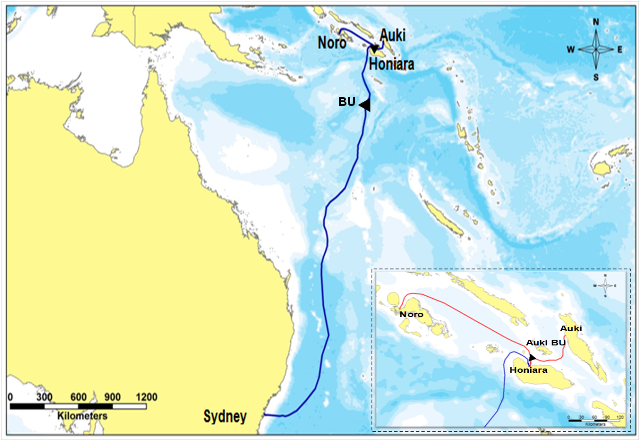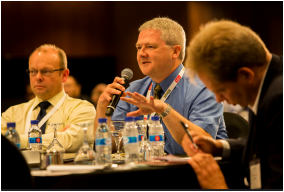|
Australia is reportedly putting pressure on the Solomon Islands to withdraw from the Project Honiara undersea cable project after the contract was awarded to Chinese telecommunications giant Huawei. The Island Sun newspaper reported that officials had said that Australia had cited security concerns to justify its actions. Project Honiara Cable Map Source: Huawei
Huawei was banned from obtaining any contracts for Australia's NBN in 2012. Reports at the time said the Attorney-General's department had blocked the company's participation based on advice from ASIO (Australian Security Intelligence Organisation). The decision to exclude Huawei was taken even though influential Coalition and Labor figures, including Alexander Downer and John Brumby, lobbied on behalf of the Chinese firm. It was also made despite objections from some Coalition MPs, including the then shadow communications spokesman Malcolm Turnbull. The Project Honiara undersea cable project is expected to improve the capacity of the local telco, Our Telekom, to handle domestic and international calls. The Solomon Islands and Huawei signed a memorandum of understanding a few weeks ago but now the start of work is expected to be delayed after Australia intervened. The newspaper said that the Australian opposition to Huawei implementing the project had been conveyed to Solomon Islands Prime Minister Manasseh Sogavare by ASIS director-general Nick Warner. Warner was said to have spoken to Sogavare when he visited the Solomons in June in connection with the end of the Regional Assistance Mission to the Solomon Islands on 29 June. The message conveyed was that if the Solomon Islands proceeded with the project, then Australia would be forced to withdraw the licence for landing rights in Sydney. The newspaper said that Warner had made it clear that any other supplier than Huawei was acceptable. It said that Sogavare's chief of staff, Robson Djokovich, had indicated that he was not aware of any official statement from either country. “National security concerns of the Australian Government about the integrity of their NBN is public knowledge and not a new issue to all stakeholders of the Submarine Cable Project,” Djokovich was reported to have said, referring to the exclusion of Huawei from NBN contracts. Huawei was contacted for comment; the company responded: "We don't have any comment to make." Source: www.iTWire.com ANALYSIS: The Government of the Solomon Islands has been trying to bring a submarine fiber optic connection to the archipelago since 2012. Through a combination of domestic politics, Asia Development Bank (ADB) bureaucracy, and shifting sands in the international market, the project has failed to get off the ground. Finally, in 2017, the Solomon Submarine Cable (SSC) Company was established by the Government, with a clear mandate to build an international cable connection. Previous options to interconnect with an existing transpacific cable were rejected in favor of a straight connection to Australia. It is not clear whether the ADB is still involved in the project as words of frustration were at one time expressed by both parties in public. It is possible that funding is now coming from Chinese sources which may explain why SSC signed a supply contract with the one supplier that they knew was unacceptable to the Australian Government. On the one hand, the Australians have to avoid appearing to be bullying one of their weaker neighbors but, at the same time, they have genuine security concerns about Huawei technology’s ability to facilitate cyber espionage and terrorism. Australia is the only country to have specifically banned Huawei technology from being deployed on its territory. From Huawei’s point of view (and that of the Chinese Government), this is a good opportunity to highlight their exclusion from the opportunity to participate in the Australian NBN project which to some observers appears to be a “gravy train”. Huawei would never challenge the ban in court because it would mean exposing their proprietary technology to scrutiny, regardless of whether it has any nefarious capabilities. If calm heads are kept, there is probably a technical solution that can be found to allow SSC to land the cable at a separate facility on Australian soil and interconnect on a dedicated link with a transpacific system, such as Southern Cross, PPC-1, Hawaiki, or Endeavour, assuming that the owners of one of those cables is prepared to interface with a Huawei system. In the United States, where “Team Telecom” does not specifically ban Huawei equipment but takes a dim view of any landing license application that includes Huawei terminal equipment, Level 3 (now CenturyLink) operated its terrestrial network with Huawei equipment for many years and Hibernia Networks (now GTT) set up dual networks to allow nervous customers to avoid having their traffic routed over the Huawei equipment in Hibernia’s system.
0 Comments
Leave a Reply. |
Julian Rawle, AuthorThought leadership articles and commentary on developments related to the subsea fibre optic cable industry can be found here. Archives
February 2018
Categories |




 RSS Feed
RSS Feed